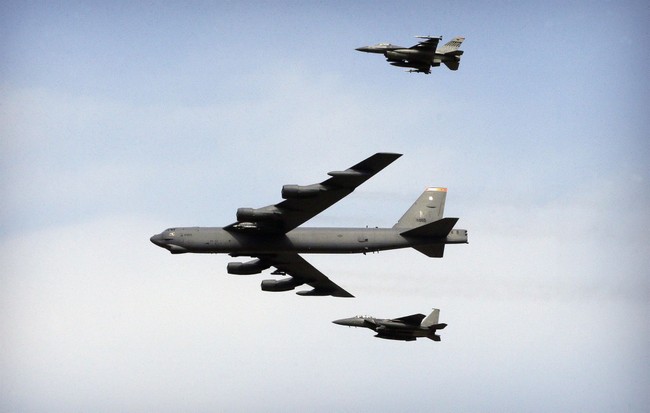
There never has been and never will be a warbird like the B-52 Stratofortress. By the time its expected end of life comes around, it will have been in service for more than a century. It’s a great bomb truck — if you need a lot of BOOM delivered in a hurry, the B-52 will get it done, and it has a 100 percent accuracy record: Every bomb dropped from a B-52 throughout its history has hit the ground.
That’s good because, as the old military saying goes, “There is no problem that cannot be solved with a suitable application of high explosives.”
Now, the new B-52J is going to be entering the service, and it’s looking like it will do credit as the latest and greatest Stratofortress variant yet.
The B-52 has been a stalwart of the U.S. Air Force since the 1950s. Eighty years after its introduction, the bomber is still relevant, with new variants planned to extend the airframe’s service life for decades to come. Indeed, the B-52 will likely reach the 100 year mark of active-duty service.
When the B-52 first flew, aviation itself was only 50 years old, so as of today, the B-52 has been in the Air Force for more than half of the time that humans have been flying airplanes. Along the way, it has received consistent upgrades – to avionics, engines, weaponry, and more – allowing the 50s-era airframe to stay useful in a modern air force.
The B-52J is the latest iteration, with a new Rolls Royce F-130 engine that promises to improve fuel efficiency and stealth performance. It also brings a new radar system borrowed from the F/A-18 Super Hornet, as well as improved weaponry.
That weaponry is impressive; but then, the B-52 loadout always was.
World War II-era B-24 Liberators had a maximum payload of 8,000 pounds for short-range flights. The B-52 can also carry nuclear ordnance: Its G and H variants can carry up to twenty AGM-69 SRAM nuclear missiles.
The J variant promises even better weapons capabilities.
“The B-52J is expected to be a versatile platform, capable of carrying a wide range of weapons, from gravity bombs to cruise missiles and hypersonic weapons,” Brandon Weichert writes. “This flexibility will allow the bomber to engage the enemy with ‘affordable mass,’ precision-guided munitions, and highly specialized, ‘exquisite’ weapons as needed.”
That presents lots of options for un-aliving bad guys. Which, of course, is the whole purpose of the Air Force and all our armed forces, at least in the non-DEI world: to close with and destroy the enemy by fire, maneuver, and shock effect, or, in the case of the Stratofortress, bombing bad guys back into the Stone Age.
See Related: Air Force Reveals New B-21 Raider Photos – But Are the Pilots Up for the Moment?
The Air Force Has an AI Warplane, Plans for 1,000 More in Four Years – Will AI Be Our Doom?
The B-52 is not stealthy. Any beauty it has would seem to be in the eyes of its crews and the people who appreciate that “Arclight means never having to say you’re sorry.” These new upgrades will make the BUFF (Big Ugly Fat Fellow) a viable system for delivering ordnance for quite a few years to come.
Because there is no problem that cannot be solved with a suitable application of high explosives.
